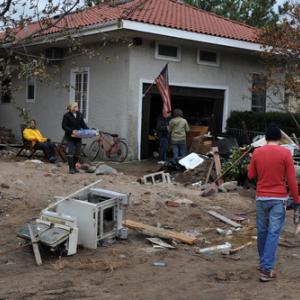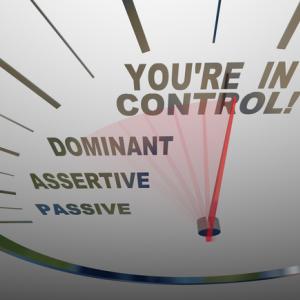Tom Ehrich is a writer, church consultant and Episcopal priest based in New York. He is the author of Just Wondering, Jesus and founder of the Church Wellness Project. His website is www.morningwalkmedia.com. Follow Tom on Twitter @tomehrich. Tom's posts appear via RNS.
Posts By This Author
I Have Seen the Problem, And It Is Us
NEW YORK — It's a short walk from Ground Zero to the Staten Island Ferry terminal.
If you're a dedicated tourist, you can see where a terrorist attack occurred on 9/11 and then hop a ferry to see where Hurricane Sandy devastated Staten Island's oceanfront last month.
Sad to say, but that's exactly what many tourists are doing. Instead of going to Staten Island to help traumatized residents, they go to gawk. Then they go back to Manhattan for lunch and holiday shopping.
This is what happens when people lose a basic sense of obligation to one another. It no longer seems sane or necessary to be charitable. Instead, people feel justified in looking away from need. They feel disconnected from neighbors who are suffering. When the storms of life hit, they call themselves “makers” and dismiss the “takers” as lazy.
Seeking Clarity
NEW YORK — The "October trifecta" that touched my life — my father's death, surgery the next day, and the unprecedented destruction of Hurricane Sandy around New York — did what traumatic events often do.
They left me emotionally fatigued and ready for some fresh clarity, fresh perspective, and fresh prioritizing.
When life seems fragile, it's clear some things matter more than others. It reminds us that attention must be paid to family, friends, and the differences we make in our work and our faith. Lesser concerns — like the tablet computer I have been angling to acquire — quickly fall away.
Disenfranchisement Is the Biggest Threat of All
Of all the ugliness in Election 2012, nothing is more disturbing than attempts to prevent people from voting. Voter suppression strikes at the very heart of American democracy.
The flood of money into this year's campaigns has been bad enough, as wealth has sought to do what wealth usually seeks to do: gain control and preference.
The shouting of lies – not just shading the truth, but outright lies – has cheapened the liars and insulted the public.
Demagogic attacks grounded in religion, phony patriotism and race have undermined public trust in all politicians. It will take years to dig out from under the rot of such scorched-earth tactics.
But denying the basic right of citizenship to millions of voters is an offense we should all be protesting. For if the powerful can deny the vote to their opponents – especially the poor and people of color – they can deny the vote to anyone.
Learning to Take It Slow
When I alerted my readers that I would be taking time off from writing to recover from surgery, many sent me kind words with a common theme: “Take time to heal.”
“Give your body time to heal,” said one. “Rest and sleep,” said another. “Be sure to take ALL the time you need for a full recovery!” and “Don't try to power through. Stop, lie down and rest. ... We will still be here.”
I was hearing the wisdom of experience: been there, didn't take the time, thought I was healed, wasn't.
That certainly has been my experience from previous times of loss and stress. I haven't always taken enough time to heal. I moved on too soon, when my head, in effect, was still woozy.
Even now, a week after surgery, I find my mind drifting off. I will be thinking through a sentence and find I have jumped tracks. I will need to read the same page of a novel several times and replay a scene in a recorded TV show.
So this time I am taking time. No rushing back to work, no making important decisions, no feeling impatient to have my wits fully about me.
Debating the Value of the Debates
Why, exactly, does it matter if President Barack Obama gave a lackluster performance in the recent presidential debate?
These quadrennial campaign sideshows have nothing to do with one's capability, preparation, aptitude or suitability for the presidency.
Why does Gov. Mitt Romney's spirited performance matter? What does a “victory” by one candidate mean, other than momentary bragging rights?
Surely we know that these debates are about as meaningful as an Oscar winner's thank-you speech. What we want from a president is a steady hand in dealing with a wicked and wayward world, a collaborative spirit in bringing a broad reach to government, and a magnanimous spirit in consoling war widows, helping victims of disaster, protecting the weak from the relentless predations of the strong, and trying to preserve an “American Dream” to which all, not just a few, are invited. We want signs of character, not a telegenic mien.
Presidential debates are like first visits to possible in-laws. You hope not to belch at supper — and then you return to the world where you are actually exploring marriage and building a life.
No Man (or Nation) is an Island
NEW YORK — Manhattan was a traffic nightmare as the United Nations General Assembly was in session and security precautions ramped up.
Iran's president gave his usual insulting address. Israel's prime minister volleyed with dire warnings of Iran's nuclear-weapons intentions. Not much was expected of a session that was more political podium than problem solving.
But the event did underscore a reality that Americans often overlook: Not everything is about us. The world doesn't turn on a politician's latest line of attack. The fine points of Obamacare or Mitt Romney's 1040 or Paul Ryan's budget? Meh.
On the one hand, this unconcern is nothing unusual; hometown affairs are always of far more interest to locals than to anyone else. I could go months without caring about Kate Middleton's topless cavorting or political show trials in Beijing.
On the other hand, it is good to be reminded that we are one piece of a vast global mosaic. We connect with others but aren't necessarily the center.
Rather than proceed as a nation-level version of the "narcissistic princess" — as one reviewer labeled tell-all author Monica Lewinsky — we should pay more attention to the connections among us.
All Politics (Should Be) Local
You can tell from its menu whether a restaurant expects to serve tourists, locals or regulars.
At a tourist-centered eatery like those near Times Square, the menu typically is huge: many pages, difficult to scan, sometimes difficult even to hold. There's something for everyone and it's designed to please customers who are strangers.
A restaurant catering to locals will have a much leaner menu, maybe just four or five items in each category. They will all be of a certain type—no words like "Asian fusion" to disguise lack of focus. If the joint is Korean, it will serve Korean.
A third and much rarer type is the restaurant that offers just one multi-course meal each night. Regulars go expecting to be served the chef's whim of the day, not handed a long menu.
When customers are strangers, the owner must imagine what will please a patchwork of German tourists, Chinese tourists, families from Iowa, young techies on the prowl, and marketers in town for a convention.
The better an owner knows the customers, the more focused the menu can be. If not the actual customer, at least the type of person who will come in.
Voting isn't all that different. When politics is local, candidates tend to know their people or at least know their interests, worries and hopes. This is the level at which democracy tends to work best. Leaders know their people, people know their leaders, and known interests are at stake.
COMMENTARY: It’s Time for Baby Boomers to Cede Control
As baby boomers start clicking the senior citizen box on travel fares, I want to say a word to my generation and to the one that preceded us.
It is time for us to get out of the way.
I don't mean easing into wheelchairs. For the most part, we're way too healthy and energetic for that. I mean the harder work of relinquishing control.
I see that need most clearly in religious institutions, where I work. But I see it elsewhere, too, from taxpayer "revolts" led by seniors against today's schoolchildren to culture wars that we won't let die.
The Shrill Are Shouting: So What?
Shrill voices, backed by vast ad spending, are trying to turn Americans against each other. And not just in vocal and behavioral disagreement, but to a depth of fear and hatred that could turn violent with little provocation.
Is it working?
To judge by the shrill echoes of shrill voices, the right wing is arming for battle, with God on their side, the flag as their shield, and the future of a white Christian nation at stake. Foolhardy politicians egg them on, and the greedy rich seem to believe that they can turn this hatred on and off to suit their quest for tax breaks.
Do the shrill represent any force larger than their own passions? Will the common-sense middle prove more durable and extensive than zealots want to believe?
Moving Forward Requires Letting Go of the Past
Comparing today with yesterday is a popular yet pointless pastime.
For one thing, we rarely remember yesterday accurately. More to the point, yesterday was so, well, yesterday — different context, different players, different period in our lives, different numbers, different stages in science, commerce, and communications.
Seeking to restore the 1950s — grafting 1950s values, lifestyles, cultural politics, educational, and religious institutions — onto 2012 is nonsense. It sounds appealing, but it is delusional.
That world didn't disappear because someone stole it and now we need to get it back. It disappeared because the nation doubled in size, white people fled racial integration in city schools, and women entered the workforce en masse. It disappeared because factory jobs proliferated and then vanished, prosperity came and went, schools soared and then soured, the rich demanded far more than their fair share, overseas competitors arose, and medical advances lengthened life spans.
The comparison worth making isn't between today and yesterday. It is between today and what could be. That comparison is truly distressing, which might explain why we don't make it.
Truth: Who Needs It?
I don't think of myself as a news-reading star; many spend far more time than I do staying informed. But I do recognize that being informed takes effort. As more and more cities lose their newspapers, and as networks like Fox abandon any pretense of journalistic integrity and simply broadcast misinformation, the work of staying informed gets more complicated.
I occasionally read broadsides from Tea Party folks and wonder what alternate universe they inhabit. Their positions seem unhinged from fact, history, and generally accepted reality. I imagine they'd say that a world informed by "liberal media" like The Times isn't any closer to being fact-based.
How do we debate important issues when we don't share a common foundation of facts? Dueling opinions are the heartbeat of politics. Dueling facts, however, lead mainly to shouting, bullying and mistrust.
Let's Hold the Rich and Powerful Accountable
Here's something curious.
Big banks can't make money without cheating, manipulating interest rates, selling overly risky products and betting against their customers.
Big pharmaceuticals can't make money without paying competitors to keep their generic products off pharmacy shelves.
Google and Facebook can't make money without monetizing customers' privacy and violating their trust. Game maker Zynga can't make money, period, but its insiders did sweep $516 million off the table by unloading soon-to-plummet stock before a lousy earnings report.
Rupert Murdoch's media empire can't make money without tapping telephones and politicizing the news on which democracy depends.
And these are the people we are supposed to trust, admire, treat as superior and as worthy of huge salaries and government bailouts.
The Temptations (and Trappings) of Silicon Valley’s Super-Rich
Forget Wall Street. Today's "best and brightest" are heading to California's Silicon Valley and New York's Silicon Alley, and to a few other tech-startup hot spots.
Thousands of aspiring engineers, web developers, designers and marketers live in dormitories, work in open-floor bullpens, attend coding competitions to enhance their skills, and work hours that defy body chemistry. It sounds like fun.
Some work on projects that make a positive contribution to society; some are coding games, entertainment apps, and schemes to monetize friendships.
They take stock for pay and wait for the magic letters "IPO" to appear. Meanwhile, their employers fight for their loyalty with free food and party-on office cultures.
The brass ring they chase looks like Marissa Mayer, the 37-year-old former Google star who was tapped to lead Yahoo out of its extended doldrums. Like any public person, Mayer is painted in stark colors: as both immensely talented and merely lucky, an inspiring leader and a rude monster, likely to succeed and sure to fail.
Despite Doubters, Mainline Protestant Churches Poised for Success
Conservative commentators like Rupert Murdoch's stable and Ross Douthat of The New York Times are feasting on what they perceive as the "death" of "liberal Christianity."
They add two and two and get eight. They see decisions they don't like — such as the Episcopal Church's recent endorsement of a rite for blessing same-sex unions. They see declines in church membership. They pounce.
Such "liberal" decisions are destroying the church, they say, and alienating young adults they must reach in order to survive.
Never mind that surveys of young adults in America show attitudes toward sexuality that are far more liberal than those of older generations. Never mind that conservative denominations are also in decline.
Never mind — the most inconvenient truth — that mainline denominations began to decline in 1965, not because of liberal theology, but because the world around them changed and they refused to change with it.
Opening Doors and Liberating Churches From ‘Sacred Spaces’
Although church conventions tend to get attention for decisions on sexuality and gender, I am more intrigued by a movement among Episcopalians to sell their national headquarters building in New York City.
Whether the shrinking national staff would leave "815" (815 Second Avenue) or remain as tenants isn't clear. Nor is it clear where they would go next if they left. Suggestions range from a large cathedral property (New York or Washington, D.C.) to a middle-of-the-country site. (Presbyterians chose Louisville, Ky., when they made a similar decision in the late 1980s.)
As a cost-cutting measure, a building sale strikes me as unpromising. Nor am I persuaded by anti-Gotham arguments. Having a church center here isn't a "Babylonian captivity" or the last relic of an "imperial dream," as critics put it.
Finding Faith in America's Most Secular City
SEATTLE — In 1962, when my younger brother was just four years old, this city perched on the nation's northwest rim held a World's Fair that imagined a glistening future.
Grounded in a vision of science and technology, the Century 21 Exposition foresaw a steady economic expansion and an orderly modernity that would continue 1950s prosperity and stability far into the future.
They got the science and technology right. Seattle is now a world hub for software development and Internet commerce, as well as for the caffeine and jeans-clad lifestyle that fuel young techs.
Being Pushy Is OK When You’re Pushing Back
Imagine the moral authority that church leaders could exercise if they turned their eyes outward to a needy world, rather than endlessly surveying the insider crowd for what they want and are willing to pay for.
Imagine if we allowed worship to change in order to make it more accessible to the world. Imagine devoting our resources to reaching younger adults and families seeking fresh purpose in a stale world. Imagine buildings being re-purposed for community needs.
Imagine a church that was giving itself away to the "least of these." And when givers push back, imagine lay and clergy leaders saying boldly, "This church isn't for sale. We have a larger purpose than keeping you happy and comfortable. This church isn't about us. It is about God and the next people whom God is trying to reach."
Becoming Unglued (In a Good Way)
What matters is human ingenuity. Allow people a window of freedom, and they will fly through it.
They will buy millions of tablet computers as escape from cramped airplane seating and being tethered to desktops. They will create homegrown social networks when Facebook goes weird with their privacy. They will abandon overpriced private colleges, avoid uninspiring suburban housing, and seek investments other than the rigged game of common stocks.
If venture capitalists exact too high a price for startup funding, entrepreneurs will turn to crowd-sourcing. While civic leaders chase yesteryear solutions like industrial parks, real job creators set up shop any old place and work around stuck politicians.
In my work with mainline Protestant churches -- perhaps the most "stuck" of any enterprise -- I see two tracks diverging.
Honor Thy Mothers and Fathers
The face of aging in America isn't a pretty one. Not because the flesh is sagging, but because the nation that once built schools, malls and suburbs for baby boomer families when they were young has turned against its elderly.
Opportunistic politicians seeking to preserve tax benefits for their wealthy patrons assault Medicare as a "socialistic" entitlement serving leeches. They take aim at Social Security as undeserved, even though recipients basically receive funds they themselves contributed over many years of working.
Banks lure the elderly into credit card debt, then slap on interest rates edging toward 40 percent and then seize property. Banks and some states siphoned off funds intended to ease mortgage stress.
If you take the time to listen, you will hear one horror story after another. People who once shared typical middle-class stories about careers and children's exploits now share dread about losing what little they have left.
Grandiose Claims About God Poison the Common Good
NORTHAMPTON, Mass. – Poor memory? Hard to say. I'm just glad I don't remember details of my college road trips to Northampton and my .000 batting average with Smith College women.
That means I can approach stopping by this charming college town as a pleasant diversion with my wife after a family lunch in nearby Worcester. I can escape shadows of feeling lost among the hyper-sophisticated Smithies. Some history deserves to be forgotten.
Moreover, what merits remembering requires reflection and fresh engagement, not just a sense of cyclical dread.
The ugly political morass of 2012 isn't just Reaganism redux: It's not just another variation on the "trickle-down" delusion – make the rich rich enough and they will discover how to share – and the economic and political destruction that flowed from chasing that fantasy. Nor is it another dabbling in McCarthyism's politics of fear and scapegoating.


















